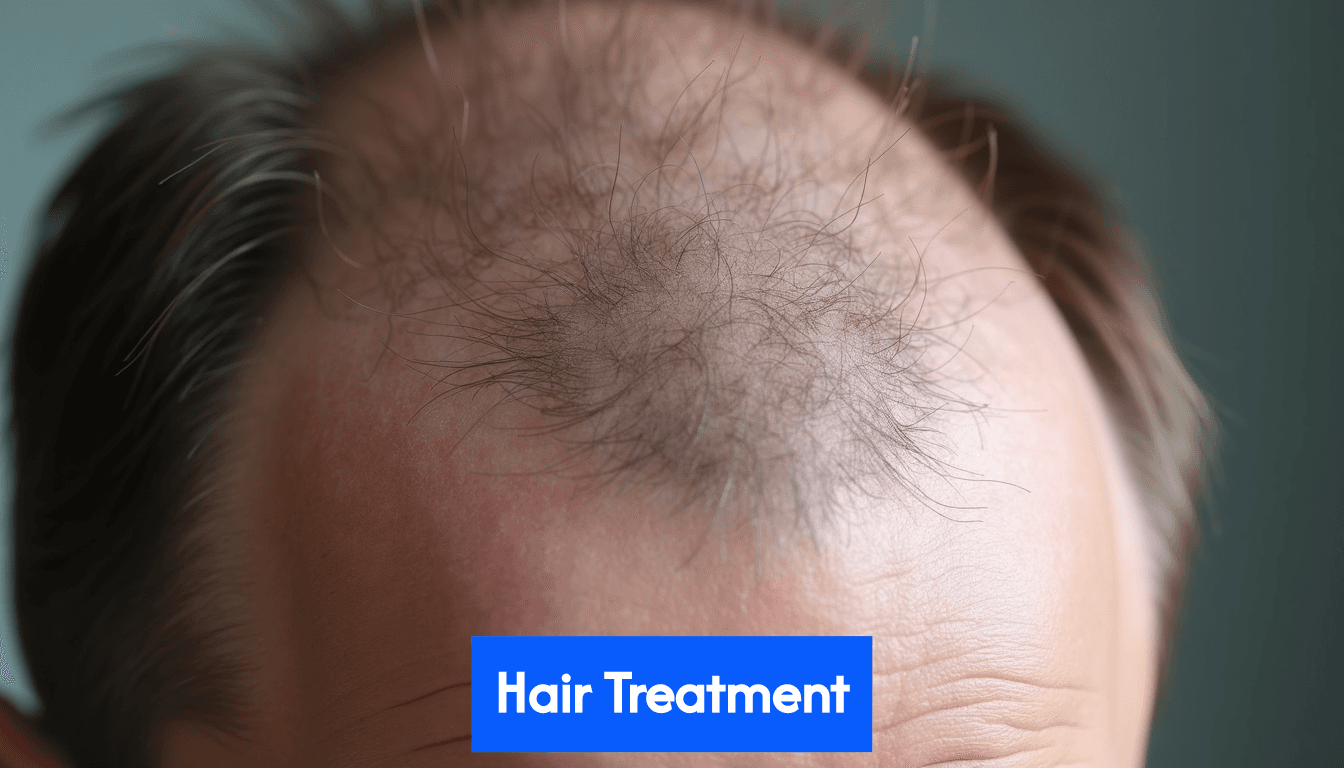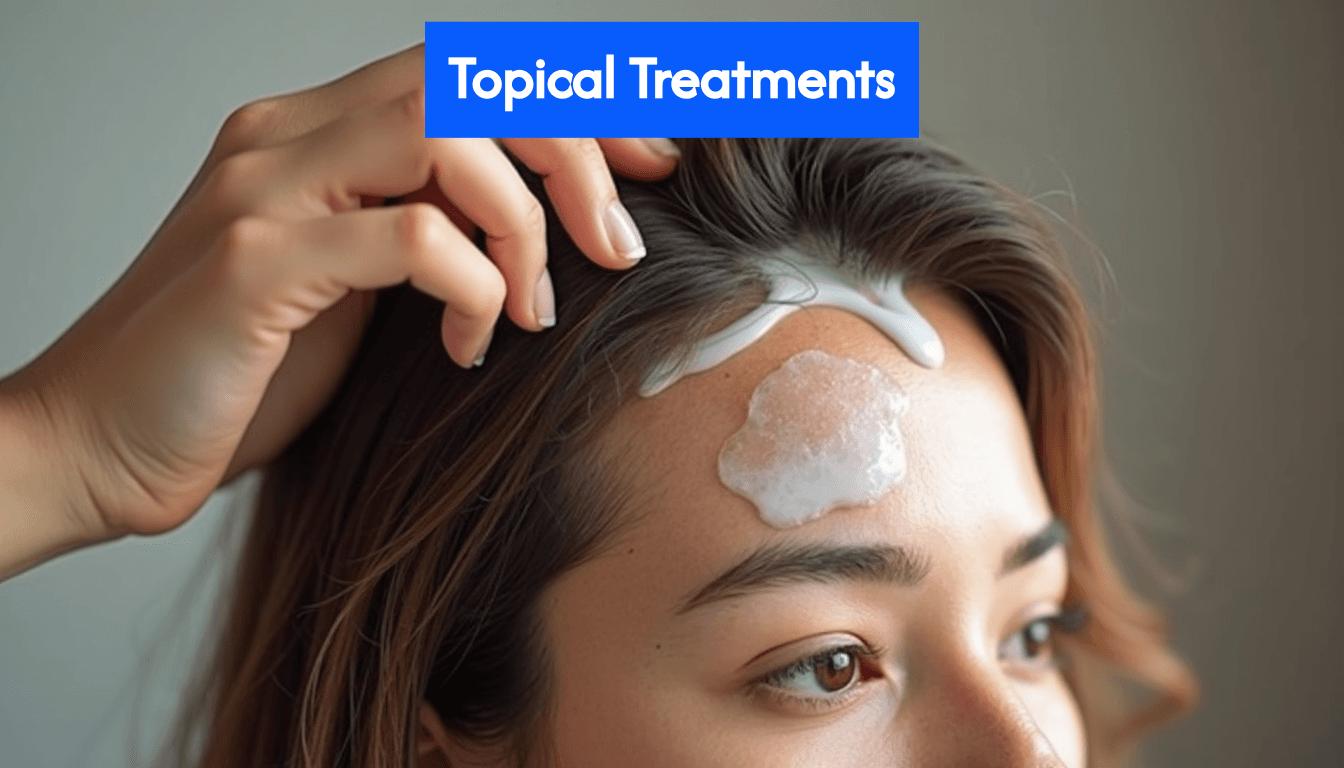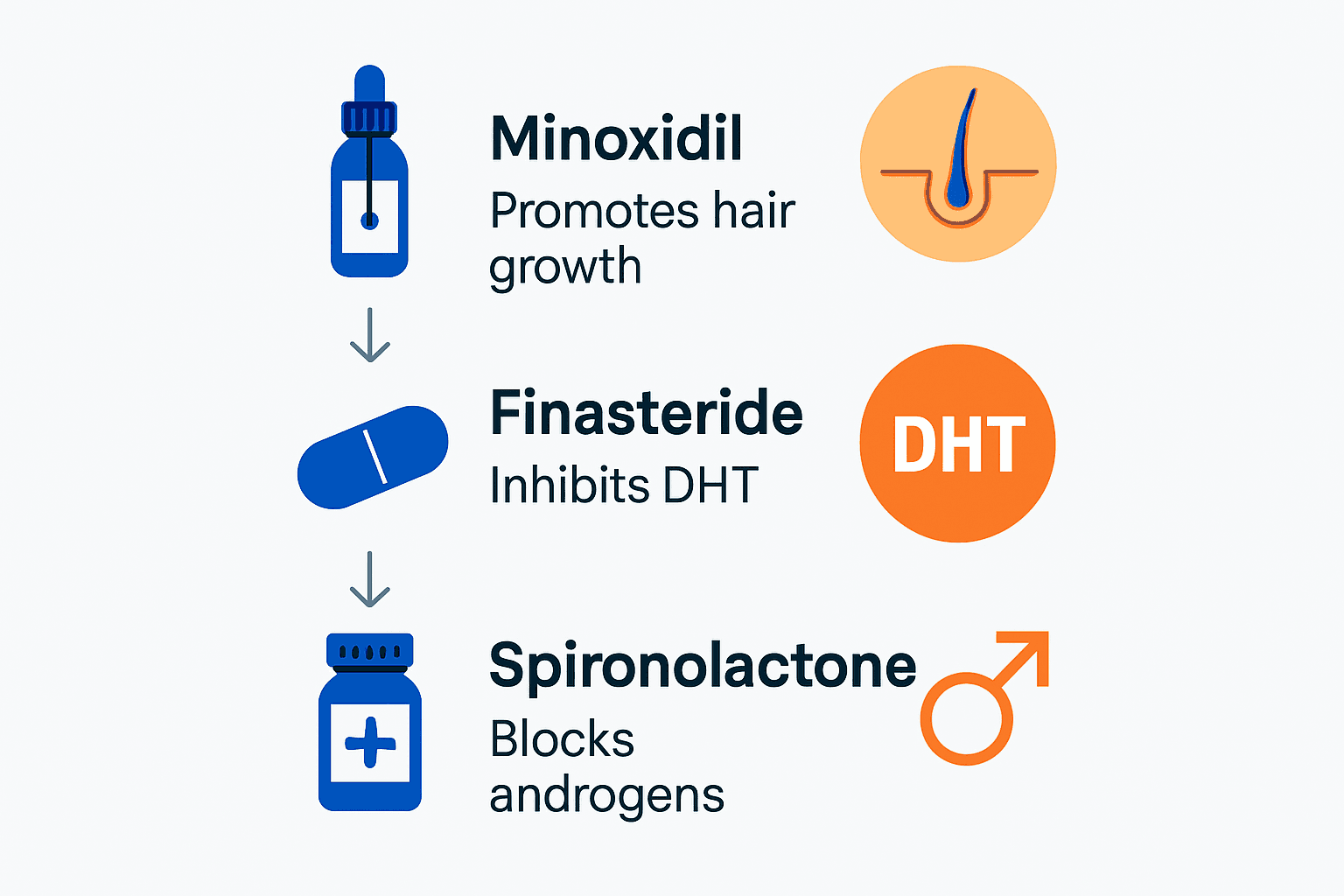Blog
Learning Materials
Hair Treatment for Thinning Hair - Options & Guide 2025
Updated: May 18, 2025

Thinning hair is more common than many people realize, impacting approximately 50% of men and women at some point in their lives. Yet you'll be surprised to learn that the majority of those affected often feel powerless about it. The truth is, there are numerous effective treatments and strategies available. Understanding your options can be the game changer you've been looking for. From topical medications to advanced procedures, the road to thicker hair is more accessible than ever.
Table of Contents
- Understanding Causes Of Thinning Hair
- Effective Topical Treatments For Thinning
- Medication Options For Hair Loss
- Advanced Procedures For Thinning Hair
- Lifestyle Changes For Healthier Hair
Quick Summary
| Takeaway | Explanation |
|---|---|
| Understanding Causes of Hair Thinning | Identify factors such as genetics, hormonal changes, and nutritional deficiencies that contribute to hair loss, enabling targeted interventions. |
| Topical Treatments as First-Line Solutions | FDA-approved options like Minoxidil and emerging treatments like PP405 provide effective methods for stimulating hair growth directly on the scalp. |
| Medication Options for Persistent Hair Loss | Medications such as Finasteride and Spironolactone can significantly manage hair loss, but should be discussed with healthcare professionals for tailored approaches. |
| Advanced Hair Restoration Procedures | Consider latest techniques, including hair transplantation and cellular regeneration, which utilize innovative methods for restoring hair growth. |
| Holistic Lifestyle Changes | Implement nutritional strategies, stress management, and proper hair care practices that support overall hair health and growth potential. |
Understanding Causes of Thinning Hair
Hair loss is a complex condition affecting millions of people worldwide, with multiple underlying factors contributing to thinning hair. Understanding these causes is crucial for developing effective hair treatment for thinning hair strategies and identifying the most appropriate interventions.
Genetic Predisposition and Hormonal Influences
Androgenetic alopecia, commonly known as hereditary pattern baldness, represents the most prevalent cause of hair loss. Research from the National Institutes of Health reveals that approximately 50% of men and women experience this genetic condition, with sons having 5 to 6 times higher risk if their fathers experienced balding. The primary mechanism involves sensitivity to dihydrotestosterone (DHT), a hormone that shrinks hair follicles and progressively reduces hair growth.
Hormonal changes can dramatically impact hair health. Women experiencing menopause, pregnancy, or thyroid disorders often encounter significant hair thinning due to fluctuating hormone levels. These hormonal shifts can disrupt the natural hair growth cycle, leading to increased hair shedding and reduced hair density.
Nutritional and Health-Related Factors
Nutritional deficiencies play a substantial role in hair loss. Inadequate intake of essential nutrients like protein, iron, zinc, and vitamins B12 and D can compromise hair follicle health and impede hair growth treatment effectiveness. Researchers at UCLA suggest that maintaining optimal nutritional balance is critical for sustaining healthy hair production.
Certain medical conditions and treatments can also trigger hair loss. Autoimmune disorders like alopecia areata cause the immune system to attack hair follicles, while treatments such as chemotherapy frequently result in temporary or permanent hair loss. Chronic stress, scalp infections, and metabolic disorders further contribute to disrupting normal hair growth cycles.
Emerging Scientific Insights
Cutting-edge research is providing new perspectives on hair loss mechanisms. University of Virginia researchers have discovered that stem cells located along the hair shaft play a crucial role in hair growth. When these stem cells become depleted or inactive, hair growth stops, suggesting potential future hair loss regrowth treatment approaches.
Understanding these diverse causes empowers individuals to seek targeted interventions. While some factors like genetics cannot be completely controlled, proactive management through nutrition, stress reduction, and early medical consultation can significantly mitigate hair thinning progression. Consulting healthcare professionals and exploring personalized treatment options remains the most effective strategy for addressing individual hair loss concerns.
Effective Topical Treatments for Thinning
Topical treatments represent a frontline approach in addressing hair loss treatment strategies, offering targeted solutions for individuals experiencing thinning hair. These treatments work directly on the scalp to stimulate hair growth, strengthen existing hair follicles, and potentially slow down hair loss progression.
FDA-Approved Topical Medications
Research from the American Academy of Dermatology highlights two primary FDA-approved topical treatments for hair regrowth. Minoxidil, available over-the-counter, remains the most widely prescribed hair treatment for thinning hair. This medication works by improving blood flow to hair follicles, extending the growth phase of hair and potentially reversing miniaturization of hair follicles.
Finasteride, another critical treatment, is typically available as a topical or oral medication. While traditionally prescribed in oral form, topical formulations have gained popularity due to reduced systemic side effects. Clinical studies demonstrate its effectiveness in blocking DHT, the hormone responsible for male pattern baldness, with fewer potential systemic complications compared to oral treatments.
Emerging Advanced Topical Solutions
UCLA researchers have recently developed PP405, a promising topical medicine applied at bedtime that shows significant potential in treating hair loss. This innovative approach represents a breakthrough in hair regrowth treatment, offering hope for individuals struggling with persistent hair thinning.

Another groundbreaking development comes from Eirion Therapeutics, which reported remarkable results with their topical ET-02 treatment. Initial clinical trials showed unprecedented hair growth improvements in as little as 5 weeks, marking a significant advancement in topical hair loss interventions.
Natural and Complementary Topical Treatments
Beyond pharmaceutical solutions, several natural topical treatments have shown promise in supporting hair health. Essential oils like peppermint, rosemary, and lavender can potentially stimulate hair follicles when mixed with carrier oils. Scalp massage techniques combined with these natural oils may improve blood circulation and support anti hair loss treatment efforts.
Compound treatments incorporating multiple active ingredients are gaining traction. Recent studies highlight SAMiRNA-AR68, a topical treatment that demonstrated significant increases in total hair counts when applied three times weekly for 24 weeks.
While topical treatments offer promising solutions, individual results can vary significantly. Consulting with a healthcare professional remains crucial in developing a personalized hair loss solution that addresses specific underlying causes and individual hair loss patterns. Patience and consistent application are key to achieving optimal results with any topical hair treatment approach.
Medication Options for Hair Loss
Medication represents a critical approach in addressing hair loss treatment, offering targeted interventions for individuals experiencing persistent hair thinning. Understanding the diverse pharmaceutical options can help patients make informed decisions about managing their hair loss effectively.
Oral Prescription Medications
Research from the American Hair Loss Association highlights two primary oral medications used in combating hair loss. Finasteride, primarily prescribed for men, works by blocking the conversion of testosterone to dihydrotestosterone (DHT), the hormone responsible for male pattern baldness. This hair treatment for thinning hair has shown significant effectiveness in slowing hair loss and potentially promoting regrowth.
Spironolactone represents an alternative medication primarily used for women experiencing hormonally-driven hair loss. This medication acts as an anti-androgen, reducing the impact of male hormones that can contribute to hair thinning. Clinical studies demonstrate its potential in managing female pattern hair loss with fewer side effects compared to traditional treatments.
Emerging Innovative Medications

Recent clinical trials have introduced promising plant-based alternatives to traditional hair growth treatment options. One groundbreaking study showed a 26% increase in new hair count within three months, offering a potentially safer alternative to existing medications. This development addresses growing concerns about side effects associated with conventional hair loss drugs.
Baricitinib represents another innovative approach in hair loss regrowth treatment. Clinical research demonstrated significant improvements in scalp hair coverage, particularly for patients with severe alopecia areata. The medication showed remarkable results in clinical trials, achieving up to 80% scalp hair coverage after 36 weeks of treatment.
Complementary Medication Approaches
Platelet-Rich Plasma (PRP) therapy has emerged as a promising complementary anti hair loss treatment. Recent medical reviews highlight its effectiveness in enhancing hair density and thickness, particularly for women. This innovative approach involves using the patient's own blood plasma to stimulate hair growth, offering a more natural alternative to traditional pharmaceutical interventions.
Patients considering medication options for hair loss should approach treatment holistically. Each medication presents unique benefits and potential side effects, making consultation with a healthcare professional crucial. Factors such as individual health history, underlying conditions, and specific hair loss patterns play significant roles in determining the most appropriate hair loss solution.
While medications offer promising results, they are most effective when combined with comprehensive hair care strategies. Nutrition, stress management, and overall health contribute significantly to treatment success. Patients should maintain realistic expectations and understand that individual responses to hair loss medications can vary widely.
Advanced Procedures for Thinning Hair
Advanced medical technologies have revolutionized hair loss treatment approaches, offering innovative solutions beyond traditional medications and topical treatments. These cutting-edge procedures provide hope for individuals experiencing persistent hair thinning by utilizing sophisticated regenerative techniques and surgical interventions.
Hair Transplantation Technologies
Modern hair transplantation techniques have dramatically evolved from traditional methods. Follicular Unit Extraction (FUE) and Follicular Unit Transplantation (FUT) represent state-of-the-art hair treatment for thinning hair strategies. These procedures involve precisely extracting healthy hair follicles from donor areas and strategically transplanting them to areas experiencing significant hair loss.
Advanced stem cell techniques now enhance traditional transplant procedures. Adipose-derived stem cells (ADSCs) are extracted, processed, and injected during transplantation to promote tissue regeneration and improve the survival of transplanted hair follicles. This innovative approach significantly increases the potential for successful hair regrowth treatment.
Cellular Regeneration Procedures
Shiseido's groundbreaking S-DSC® therapy represents a remarkable advancement in hair regenerative medicine. This procedure involves culturing autologous dermal sheath cup (DSC) cells and strategically injecting them into the scalp to stimulate hair growth. The treatment has shown promising results for both male and female pattern baldness, offering a personalized anti hair loss treatment approach.
Dermal papilla cells (DPCs) have emerged as another promising cellular intervention. Research demonstrates that these cells, located at the base of hair follicles, can induce new hair follicle formation when strategically implanted between the epidermis and dermis. Unlike other cellular treatments, DPCs maintain their hair-inductive properties during in vitro expansion, presenting a potentially more sustainable long-term solution.
Emerging Technological Interventions
Laser therapy and low-level light treatments represent non-invasive advanced procedures for addressing hair thinning. These technologies stimulate cellular activity and blood circulation in the scalp, potentially reversing miniaturization of hair follicles. Clinical studies indicate that consistent low-level laser treatments can improve hair density and slow progression of hair loss.
Robotics and artificial intelligence are progressively being integrated into hair restoration procedures. Computer-assisted extraction and implantation techniques allow for unprecedented precision in follicle selection and placement, minimizing human error and maximizing potential hair loss solution outcomes.
Patients considering advanced procedures should approach these treatments holistically. While technological interventions offer remarkable potential, individual results can vary based on factors like age, overall health, and specific hair loss patterns. Comprehensive consultation with specialized hair restoration professionals remains crucial in determining the most appropriate and effective treatment strategy.
Lifestyle Changes for Healthier Hair
Healthier hair begins with holistic lifestyle modifications that address internal and external factors contributing to hair strength and growth. Understanding how daily habits impact hair treatment for thinning hair can empower individuals to take proactive steps toward maintaining robust, resilient hair.
Nutritional Strategies for Hair Health
Research from nutritional experts emphasizes the critical role of balanced nutrition in supporting hair growth treatment. A diet rich in protein, essential vitamins, and minerals directly influences hair follicle health. Key nutrients like biotin, vitamin D, iron, and zinc play fundamental roles in hair production and maintenance.
Protein-rich foods such as lean meats, fish, eggs, and legumes provide amino acids essential for keratin production. Omega-3 fatty acids found in salmon, chia seeds, and walnuts support scalp health and reduce inflammation. Incorporating a diverse range of nutrients ensures comprehensive support for hair follicle function and potential anti hair loss treatment benefits.
Stress Management and Physical Activity
Clinical studies reveal a profound connection between stress levels and hair health. Chronic stress triggers cortisol release, which disrupts hormone levels and can accelerate hair thinning. Implementing effective stress reduction techniques like meditation, yoga, and regular exercise can mitigate these negative impacts.
Physical activity supports hair health by improving blood circulation, which enhances nutrient delivery to hair follicles. Cardiovascular exercises, strength training, and consistent movement stimulate metabolic processes that contribute to overall hair vitality. Aim for at least 150 minutes of moderate exercise weekly to support optimal hair loss solution strategies.
Holistic Hair Care Practices
Daily hair care routines significantly impact hair strength and growth potential. Experts recommend minimizing heat styling, using gentle hair products, and protecting hair from environmental damage. Silk or satin pillowcases reduce friction, while regular scalp massages can stimulate blood flow and potentially support hair growth.
Hydration plays a crucial role in maintaining hair health. Drinking adequate water supports cellular functions and helps transport nutrients essential for hair growth. Consider supplementing with natural oils like coconut or argan oil to provide additional nourishment and protection for hair strands.
Individuals experiencing persistent hair thinning should view lifestyle changes as a comprehensive approach to hair loss regrowth treatment. While these strategies cannot guarantee complete hair restoration, they provide a strong foundation for supporting healthy hair growth. Consulting healthcare professionals can help develop personalized strategies tailored to individual needs and underlying health conditions.
Frequently Asked Questions
What are the main causes of thinning hair?
Thinning hair can be caused by a variety of factors, including genetic predisposition, hormonal changes, nutritional deficiencies, and certain medical conditions. Understanding these causes is essential for developing effective treatments.
What topical treatments are available for thinning hair?
Several FDA-approved topical treatments, such as Minoxidil, are available for hair regrowth. Emerging options like PP405 and natural alternatives like essential oils also show promise in supporting hair health.
What medication options exist for hair loss?
Oral medications such as Finasteride and Spironolactone are commonly prescribed for hair loss. Emerging plant-based alternatives and therapies like Platelet-Rich Plasma (PRP) also offer potential for effective treatment.
What lifestyle changes can help promote healthier hair?
Implementing nutritional strategies, managing stress through exercise and relaxation techniques, and adopting holistic hair care practices can significantly support hair health and potentially mitigate thinning.
Transform Your Thinning Hair Journey with Personalized Insights!
Feeling like your hair’s vitality is slipping away? As discussed in our comprehensive guide on hair treatment for thinning hair, understanding your unique hair loss triggers—from hormonal influences to nutritional deficiencies—is essential for effective intervention. You don't have to navigate this path alone; individual factors can complicate your journey, but with the proper insights, you can take control of your hair health.

At MyHair.ai, we harness advanced AI technology to analyze your hair health, transforming personal assessments into actionable strategies. With features like:
- Detailed hair health analysis
- Personalized growth projections
- Tailored product recommendations
you can tackle hair thinning more effectively and restore confidence in your locks. Don’t let thinning hair define you! Visit https://myhair.ai now to start your personalized journey towards thicker, healthier hair. Your hair deserves this care—act NOW to uncover solutions designed just for you!